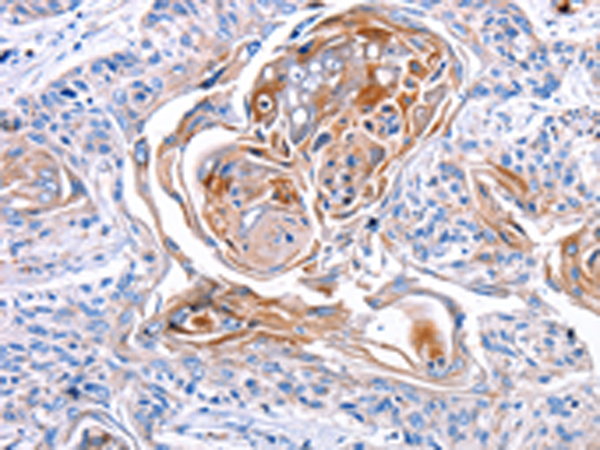
| WB | 咨询技术 | Human,Mouse,Rat |
| IF | 咨询技术 | Human,Mouse,Rat |
| IHC | 1/25-1/100 | Human,Mouse,Rat |
| ICC | 技术咨询 | Human,Mouse,Rat |
| FCM | 咨询技术 | Human,Mouse,Rat |
| Elisa | 1/1000-1/10000 | Human,Mouse,Rat |
| Aliases | NTN, NTT, CXC3, CXC3C, SCYD1, ABCD-3, C3Xkine, fractalkine, neurotactin |
| Host/Isotype | Rabbit IgG |
| Antibody Type | Primary antibody |
| Storage | Store at 4°C short term. Aliquot and store at -20°C long term. Avoid freeze/thaw cycles. |
| Species Reactivity | Human, Mouse, Rat |
| Immunogen | Synthetic peptide of human CX3CL1 |
| Formulation | Purified antibody in PBS with 0.05% sodium azide and 50% glycerol. |
+ +
以下是关于CX3CL1抗体的3篇参考文献概览:
---
1. **文献名称**: *Role of Fractalkine (CX3CL1) in Atherosclerosis: Functional Studies with a Neutralizing Antibody*
**作者**: Combadière C, et al.
**摘要**: 该研究使用中和性抗CX3CL1抗体在小鼠动脉粥样硬化模型中阻断CX3CL1/CX3CR1信号通路,结果显示抗体显著减少单核细胞黏附和斑块形成,提示CX3CL1在炎症性血管疾病中的关键作用。
---
2. **文献名称**: *Targeting CX3CL1 in Neuroinflammatory Diseases: Antibody-Mediated Suppression of Microglial Activation*
**作者**: Ransohoff RM, et al.
**摘要**: 通过抗CX3CL1抗体抑制小胶质细胞活化,研究发现其可减轻阿尔茨海默病模型中的神经炎症和神经元损伤,表明CX3CL1抗体在神经退行性疾病中的潜在治疗价值。
---
3. **文献名称**: *CX3CL1 Neutralization Attenuates Tumor Metastasis via Macrophage Reprogramming in the Tumor Microenvironment*
**作者**: Bazan JF, et al.
**摘要**: 研究利用抗CX3CL1抗体阻断肿瘤微环境中CX3CL1信号,发现其能抑制巨噬细胞促转移功能并降低乳腺癌模型中的肺转移率,为癌症免疫治疗提供了新思路。
---
以上研究均聚焦于抗CX3CL1抗体在疾病模型中的干预效果,涵盖心血管、神经及肿瘤领域。如需具体文献信息,建议通过PubMed或Web of Science检索标题及作者进一步查阅全文。
CX3CL1. also known as fractalkine, is a unique chemokine that exists in both membrane-bound and soluble forms. It functions as a ligand for the CX3CR1 receptor, playing critical roles in immune regulation, inflammation, and cell adhesion. CX3CL1 is expressed in endothelial cells, neurons, and epithelial cells, and is involved in leukocyte recruitment, neuro-immune crosstalk, and tissue homeostasis. Its dual structural form allows it to mediate either cell adhesion (via the membrane-bound form) or chemotaxis (via the soluble form).
CX3CL1 antibodies are essential tools for studying its expression, localization, and functional interactions. These antibodies are widely used in techniques like Western blot, immunohistochemistry, flow cytometry, and ELISA to detect CX3CL1 in biological samples. Research applications focus on understanding its role in diseases such as neurodegenerative disorders (e.g., Alzheimer’s disease), cardiovascular diseases (e.g., atherosclerosis), cancer metastasis, and chronic inflammatory conditions. For example, elevated CX3CL1 levels are linked to neuroinflammation, while its dysregulation in tumor microenvironments may influence immune evasion.
High-quality CX3CL1 antibodies exhibit specificity for distinct epitopes or isoforms, enabling precise mechanistic studies. Validated antibodies help explore CX3CL1/CX3CR1 signaling pathways, therapeutic targeting potential, and biomarker utility. Recent studies also highlight its involvement in macrophage polarization and T-cell trafficking, underscoring its broad relevance in immunology and pathology.
×